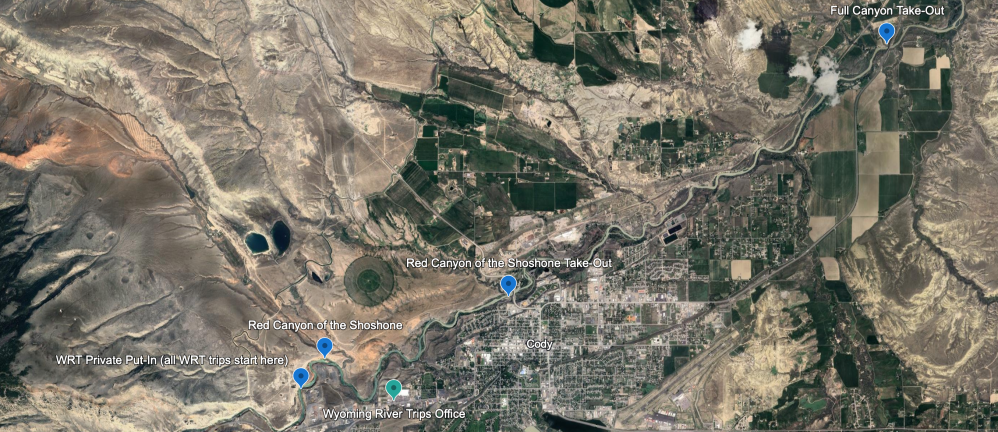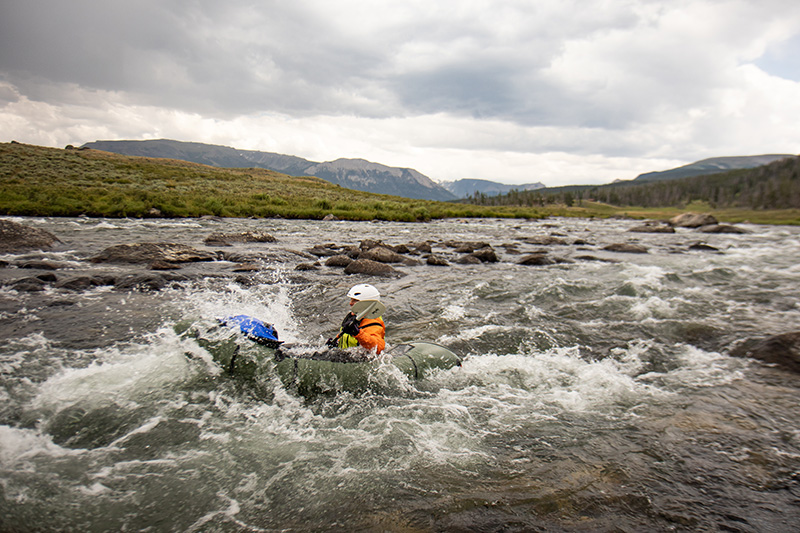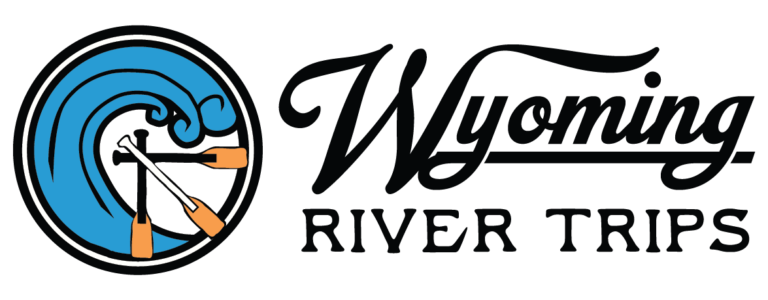Intermediate Packrafting -Two Day Clinic
Intermediate Packrafting
$550
2 Day Packrafting Clinic - Multi-day adventures near Yellowstone, Cody Wyo
- Some minimum fitness level may be required depending on river section chosen. WRT staff will ask about your groups age, height, weight and general fitness level when making decisions about the best trip for your group or family.
Read more in our About Us section.
Whitewater means wet! We suggest dressing in layers.
For May – early June: non-cotton underwear or bathing suit (this helps keep your warm while cotton will keep you cool through evapotranspiration), non-cotton shorts or pants, and non-cotton t-shirt and then long sleeve shirt. If guests need fewer layers, that’s easy! Just take off your long pants or long shirt. If guests need more layers, we provide splash tops and bottoms. The layers you have on already will help trap your body heat.
Mid June – Aug: some type of underwear or bathing suit, t- shirt and shorts, if you are a person who gets cold feel free to bring a long sleeve as well. Remember that cotton will cool you down. On a day where you are rafting at 1:30pm and it is supposed to be 98 degrees, cotton will help you stay cool. If you are rafting at 9am and the forecast calls for light clouds and 65, less cotton will keep you warmer until the sun makes it’s appearance later that morning.
All guests should Wear shoes that can get wet and will stay on your feet. We recommend sneakers or sandals that strap on. Flip flops are not the best. If you lose one in a rapid, there is no guarantee we will find it and it will make it more difficult to find a solid footing in the slippery boat. We rent wetsuit booties for those who don’t have appropriate footwear. Please be advised, these do not offer very much ankle support and the footbed is fairly thing. If you have sensitive feet, we recommend something that you own with thicker sole
A detailed list of what to wear and what to bring will arrive in your confirmation email along with next steps for how to sign your waiver and tell us about dietary restrictions.
Bring:
- Reusable water bottles
- Sunscreen
- Change of clothes
- Dress in layers — opt for quick-drying clothing, synthetic insulating layers
- Secure footwear that can get wet
Deposits on Specialty and Multi-day trips are non-refundable. Notice of cancellation must happen at least 1 week before trip date for all specialty trip reservation, to be considered for a partial refund. Refunds are not guaranteed.
Reservations made less than 1 week in advance are not eligible for refunds, should the guest need to cancel.
Wyoming River Trips reserves the right to cancel any trip for any reason. Cancellation reasons may include but are not limited to: weather, safety concerns pertaining to water levels, hazards or client ability, environmental factors, client ability levels/fitness/injury or illness. Weather-related cancellations made by WRT may be eligible for a refund.
WRT reserves the rights of and supports any guides’ decision to stop a trip at any point if they feel they can not manage the objective or subjective risks presented by the environment, people or combination of both.
Cancellations due to subjective factors, such as the behavior or fitness of an individual/s in your party will not be eligible for refunds. This includes children.
WRT highly recommends that all participants purchase trip insurance. We do not sell insurance and cannot answer insurance questions. We recommend contacting Faye Travel Insurance or Generali Travel Insurance.
Faye Travel Insurance offers our customers Domestic trip insurance at affordable rates—covering your flights, rv travel, rafting adventure and even instances of food poisoning.
For questions regarding coverage, contact Julie Baker directly: [email protected]
Generali offers trip insurance covering the same for our International guests.
Contact [email protected] for help and reference Wyoming River Trips
** Cancellation Policy for Groups of 10 or more **
Groups of 10-20 must give WRT at least 1 week notice of cancellation and your deposit is non-refundable. If a group cancels within 1 week, WRT reserves the right to charge the full amount of the trip. For groups of 20 or more, cancelations or major changes to the reservation numbers MUST BE MADE 2 WEEKS BEFORE TRIP DEPARTURE. For groups of 20 or more, changes or cancellations made inside of 2 weeks, WRT reserves the right to keep your deposit. Groups of 20 or more are subject to full charge of trip if cancellations are made within one week of trip launch date.
Wyoming River Trips guides are professionals, and your safety is their highest priority. However, no outdoor activity is without some inherent risk. You must acknowledge and, in substantial measure, accept that risk. All adult participants, and parents or guardians of minor participants under the age of 18, must sign an Acknowledgment of Risk form required by our insurance company. Please allow sufficient time for this, and check-in at our office when you arrive.
Please be sure to let us know about physical or mental limitations we need to accommodate prior to arrival and about any medication you might need to have with you on the boat (eg. inhalers, EpiPens, etc).
Minimum Eligibility Criteria for Packrafting and Wyoming Rivers Cooperative Packrafting Adventures
The following are the physical and mental eligibility criteria for all participants on any WRC river trip or packrafting adventure with Wyoming River Trips. By signing up for a packrafting trip or clinic, you are stating you have read, understand and to the best of your knowledge and meet these eligibility criteria.
You are able to:
- Remain seated and balanced while in a whitewater craft while holding on with at least one hand.
- Wear a Type V Coast Guard-approved personal floatation device (maximum chest size of 56 inches). Wearing leg straps may be required to ensure proper fit. Where required, properly wear a helmet.
- Independently board and disembark a boat four to ten times each day. This may require stepping into the boat, and then maneuvering your body over and across tubes and fixed objects into a seated position. This may require the ability to sit low in a boat with a spray skirt securing you to the vessel. You are able to remove the spray skirt and exit the boat.
- Independently navigate shoreline terrain, including safely maneuvering around and across boulders, rocks, and slippery and uneven surfaces, under low branches, and around vegetation. This includes the ability to maintain your balance near precipitous ledges or cliffs.
- Independently swim in whitewater or swift currents while wearing a PFD. This includes being an active participant in your own rescue, including having the ability to
(a) keep your airway passages sealed while underwater, and regain control of your breathing when being submitted to repeated submersion under waves or currents; (b) orient yourself to new “in-river” surroundings; (c) reposition yourself in the water to different swimming positions; (d) swim aggressively to a boat or to shore in whitewater; (e) receive a rescue rope, paddle, or human assistance, and possibly let go of the same; (f) get out from under an overturned boat.
- Swim 100 yards in flat water while wearing a PFD.
- Assist another passenger who has fallen out of the boat by pulling them back in.
- Follow both verbal and non-verbal instructions given by guides in all situations, including during stressful or dangerous situations, and to effectively communicate with guides and other guests.
- Carry personal dry bags and other personal gear (as heavy as 20-30 pounds) uphill from the boats to your camping location and back the next morning, independently, or with the assistance of a friend or family member. (This only applies on multi-day trips).
- Manage all personal care independently, or with the assistance of a friend or family member.
- If taking prescription medications, have the ability to maintain proper dosage by medicating independently, or with the assistance of a friend or family member.
- Remain adequately fed, hydrated, and properly dressed so as to avoid environmental injuries such as hypothermia, heat related illness, sunburn and frostbite.
The above criteria, if not met, will disqualify a person from participating in a river trip with WRC. The criteria exist for your own safety and that of all trip participants. None of the criteria are meant to discriminate on the basis of any physical or mental disability, and are applied uniformly to all potential trip participants, irrespective of the presence or absence of any disability. WRC is committed to making reasonable modifications to any trip for any persons with a disability, so long as they do not fundamentally alter the nature of the trip.
- Shuttles
- Guides
- Equipment
- Splash Gear
- Meals
- Activities (like Yoga)
- Camping/ Accommodations
- Guide Gratuity
2 Day Packrafting clinic – 2 consecutive days traveling by boat on Wyoming waterways
- Meet at our office/designated meeting location at designated time and review participant equipment
- Additional outfitting and plan for the day
- Travel to the river
- Emergency Procedures review for this location
- Map review and plan
- Gear care and use
- currents/swimming/wet entry and exit
- River communication and signals
- Self rescue and assisted rescue review
- Basic Paddle Skills recognizing and using hydrologic features
- Ferry angles and eddy catching practice
- lunch on the river with discussion of packrafting limitations, water travel in Wyoming and the west in general, permitting and trip planning considerations
- Return around 3pm, review the days learnings, Q and A, future recommendations.
Wyo Rivers provides lunch and snacks each day, but not breakfast or dinner on Packraft 101 trips. This trip type offers participants the chance to paddle each day and enjoy the Cody area in the evenings.
Day 2
- Wildlife awareness and risk management discussion
- Emergency Procedures for this location
- Map review and plan for the day
- River spacing, signal review an scouting discussion
- Decision making tools
- Setting safety and throw bags
- lunch and remote travel consideration discussion
- Hydration and weather discussion
- Gear pack and return shuttle to office around 4 or 5pm
Our Warehouse and Office also includes
- On-site parking
- Limited RV parking, please call.
- Proximity to Wal-Mart, for more easy RV parking
- Changing facilities
- Bathrooms/Outhouse
- Shopping and waiting room
All passengers should be in good health and have the ability to move dynamically in a moving water environment. If you have concerns about whether or not you meet these criteria, please give us a call to discuss trip options.



